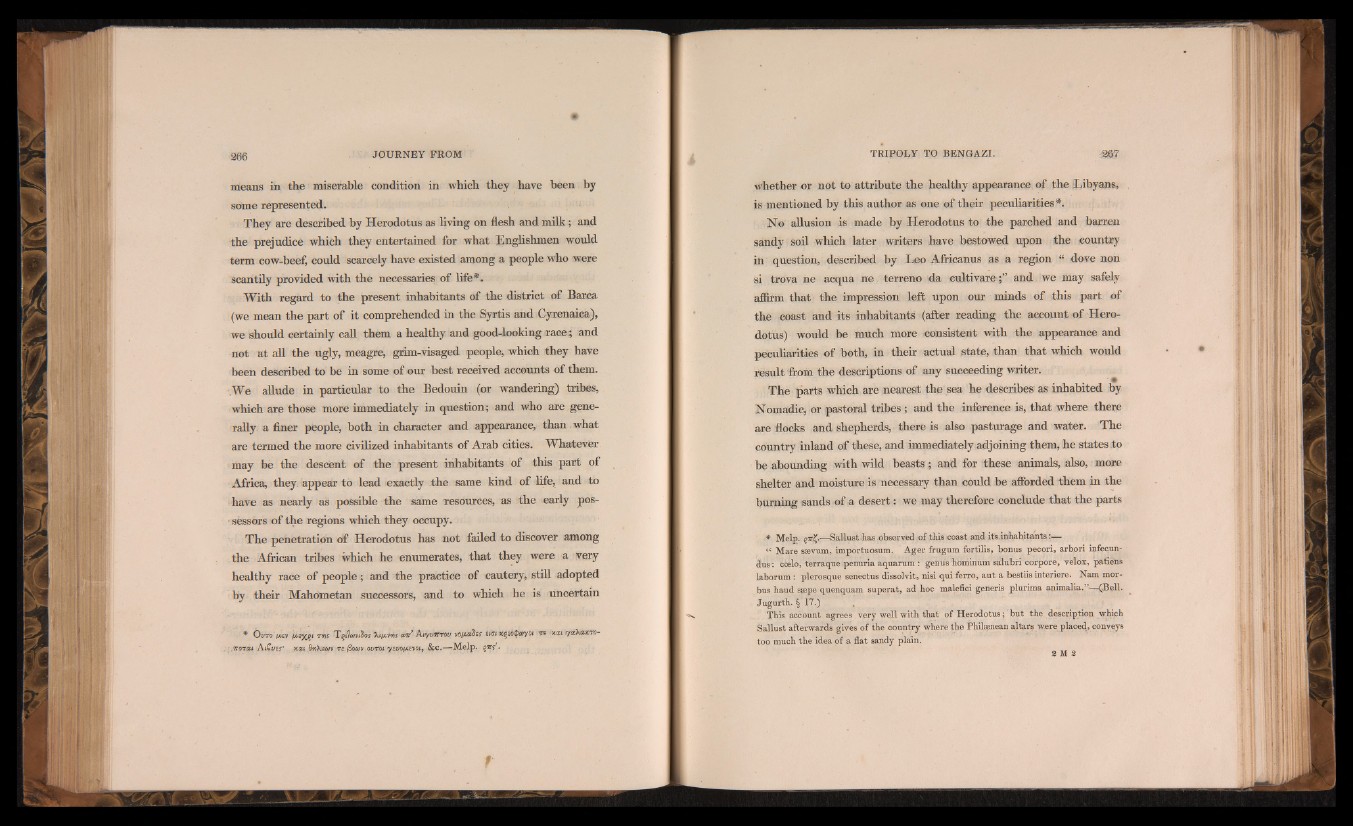
means in the miserable condition in which they have been by
some represented.
They are described by Herodotus as living on flesh and milk; and
the prejudice which they entertained for what Englishmen would
term cow-beef, could scarcely have existed among a people who were
scantily provided with the necessaries of life*.
With regard to the present inhabitants of the district of Barca
(we mean the part of it comprehended in the Syrtis and Cyrenaica),
we should certainly call them a healthy and good-looking race? and
not at all the ugly, meagre, grim-visaged people, which they have
been described to be in some of our best received accounts of them.
We allude in particular to the Bedouin (or wandering) tribes,
which are those more immediately in question; and who are generally
a finer people, both in character and appearance, than i what
are termed the more civilized inhabitants of Arab cities. Whatever
may be the descent of the present inhabitants of this part of
Africa, they appear to lead exactly the same kind of life, and to
have as nearly as possible the same resources, as the early possessors
of the regions which they occupy.
The penetration of Herodotus has not failed to discover among
the African tribes which he enumerates, that they were a very
healthy race of people; and the practice of cautery, still adopted
by their Mahometan successors, and to which he is uncertain
* Ouro i*sv -r„r TgiiiwviSoy Xi/j,v/is ot/n' A i y w r o v vo/AdXef u tfi xgEdpceyoi w ixgci tya k a icw -
,7loral A£vss' .xqci OmXewv teJ3o»v ovt'qi yzvofAsvo;, &c.—Mejp. .
whether or not to attribute the healthy appearance of the Libyans,
is mentioned by this author as one of their peculiarities*.
No allusion is made by Herodotus to the parched and barren
sandy soil which later writers have bestowed upon the country
in question, described by Leo Africanus as a region “ dove non
si trova ne acqua ne terreno da cultivare;” and we may safely
affirm that the impression left upon our minds of this part of
the coast and its inhabitants (after reading the account of Herodotus)
would be much more consistent with the appearance and
peculiarities of both, in their actual state, than that which would
result from the descriptions of any succeeding writer.
The parts which are nearest the sea he describes as inhabited by
Nomadic, or pastoral tribes ; and the inference is, that where there
are flocks and shepherds, there is also pasturage and water. The
country inland of these, and immediately adjoining them, he states to
be abounding with wild beasts ; and for these animals, also, more
shelter and moisture is necessary than could be afforded them in the
burning sands of a desert: we may therefore conclude that the parts
* Melg. —Sallust has observed of this coast and its. inhabitants:—
<* Mare ssevum, importuosum. Ager frugum fertilis, bonus pecori, arbori infecun-
dus: cielo, terraque penuria aquarum: genus hominum sálubri corpore, velox, patiens
laborum: plerosque senectus dissolvit, nisi qui ferro, aut a bestiis interiere. Nam morbus,
hand ssepe quenquam superat, ad hoc malefici generis plurima animalia.”—(Bell.
Jugurth. § 17.) ,
This account agrees very well with that of Herodotus; but the description which
Sallust afterwards gives of the country where the Philaenean altars were placed, conveys
too much the idea of a flat sandy plain.